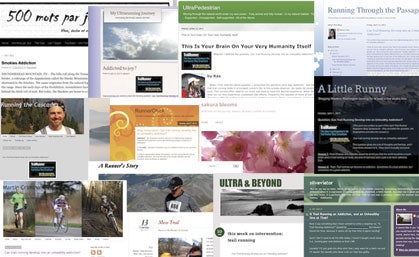Bloggers Weigh in on Running Addiction

Highlights from the April 2013 Trail Runner Blog Symposium
The April 2013 Trail Runner Blog Symposium topic of discussion was: Can trail running develop into an unhealthy addiction?
Undoubtedly, few of us appreciate the healthiness of our passions being called into question—wrote one blogger, “ Get off my back Trail Runner Magazine! I’m fine!”—and yet, at one point or another, many of us have needed to justify to “an outsider” our, um, somewhat unusual compulsions and routines. Below is a little ammo to help you do so in the future … as well as some food for thought on when our habits might indeed toe the line of unhealthy addiction.
Our Editor’s Choice, ‘Trail Running and Addiction—Staying Mindful’, by Ben Luedke at Running the Cascades presents a practicing psychotherapist and active ultrarunner’s thoughtful perspective on the issue.
Next month’s topic: Social Media—Bane or Boon to Trail Running? See here for directions on how to participate.
NO
Unhealthy’ is truly the operative word in that question. Whether running can be an addiction or not is immaterial … Trail running is an essential and quintessential human activity, an artifact from the savannah, from when we were just distinguishing ourselves from the broader designation of ‘hominid’.
—UltraPedestrian Ras
By age 25, I was diagnosed with anorexia nervosa and entered treatment. At 5’9″ and 90 lbs., my body was failing … Training for & running my first marathon at age 27 marked the beginning of the end of my addiction. Running long distances on trails requires fuel, oomph, guts, drive and spunk. The old me would have never even made it to the start line.
—sakura blooms: Erin Earle
I do spend an inordinate amount of time on the trails, but I feel like I have good reasons: it’s an activity I love which has strengthened my marriage and other relationships (I’m thankful for a tough-as-nails ultrarunning wife and nature-loving trail-buddies), improved my mental and physical health (three years, no injuries worse than a pulled muscle), increased my self-confidence, and allowed me to have experiences that have ultimately made my life more meaningful and enjoyable (Mountains! Water! Forests! Beer with friends!)
—A Little Runny: Timothy Mathis
Assuming that by ‘unhealthy’ you mean: getting outside most days every week, working out in the cold and wet which makes you appreciate those bluebird days that much more, and forming incredible bonds with friends and exploring new routes that most people don’t even hike … then the answer to that question would be an unqualified ‘yes’.
—Martin Criminale
YES
Addiction cannot always be seen until the thing you are addicted to is taken away … and you cannot cope without it. I became injured and I couldn’t run. I had placed everything I loved in running. I WAS my running. In my mind, I was “Shannon the Ultrarunner”. Without running, I lost the identity I had created for myself. I lost my joy. I lost my peace.
—My Ultrarunning Journey: Shannon Stone
Do I come home tired and lethargic because I’ve run too much, too far or too early in the day? Do I miss some family time because I just have to get another run or race in? … and do I regret any of these decisions?
—silvaviator: Michael Linscott
Lots of runners have replaced other addictions, drugs, alcohol, etc. with running and call running their “healthy addiction.” I think trail runners like to think of themselves as slightly different from your standard road runner, a bit more healthy perhaps because we run and train in the wilderness, not in smog infested streets.
—Running the Passage: Sarah Young-MacDonald
MAYBE
I’m a psychotherapist who works with people struggling with addiction, and I’m also a long-distance trail runner … On a personal level, I don’t like considering the possibility that the positive feelings I obtain from trail running might lead to an unhealthy addiction. However … my hesitation to answer points to the possibility of denial, and denial is a common attribute of (an unhealthy) addiction.
—Running the Cascades: Ben Luedke
That’s the exquisite form of an elite athlete and that level of skill comes only from training to the point your body has reached the level of art. I have no doubt coming down from such a high is painful. I know firsthand what it feels like to be sidelined from injury. The addiction left unfed worms its way through your mind until it’s destroyed all self-confidence. Unwinding an addiction is ugly. But when it’s created beautiful art, it can’t be bad.
—A Runner’s Story: Ed Mahoney
To me, the question is more of what other addictions can be spawned by trail running … When you’re introduced to all of the races and venues around the globe … your checking account shudders at the upcoming blood loss. Your finger nearly breaks the F5 key on opening day of registration to get a coveted spot. Boom! You’ve landed a spot, you race, and then your body comes down off of the high.
—Robyn Rittis
[Running] might be just what the doctor ordered to manage stress, or weight, or cholesterol, or whatever. So until I’ve broken both femurs and the mountain lion drags me off the trail … I’m going to keep trail running.
—Runner Chick
Stan never joined his high school XC team. He didn’t mind racing, but the loner hated the team aspect. Instead, he kept running the Appalachian Trail. Relentlessly. After he graduated, he spent the summer racing in Europe. He made a few Euros and lots of pals. “I got hooked, bro. Badly.”
—Stéphane Rodriguez
You might also be interested in: